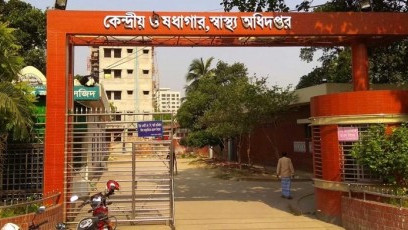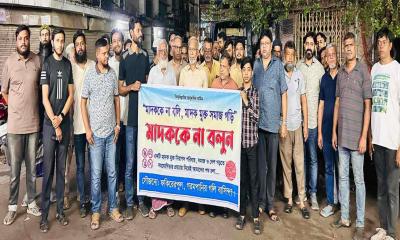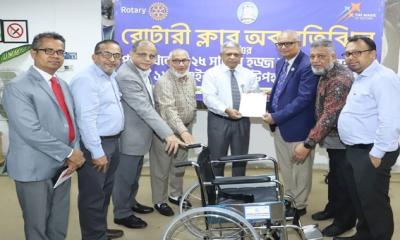-Promotion proposal to Directorate of Health Equipment is awaited for policy approval
-Saving Tk hundred crore of state through self-clearance license
-Purchasing, stocking & supplying of medical equipment is digitized
"CMSD is working to ensure transparency & accountability; we are working towards implementation of smart healthcare"
Mohammad Hasan Arif, Director, CMSD
The country's health sector has undergone revolutionary changes in the last two decades. Specialized hospitals, medical colleges, upazila health complexes, community clinics, and union health centers have increased. Necessary medical equipment is needed only after the construction of the infrastructure of these hospitals and health centers. The central dispensary (CMSD) is the state institution that procures, stocks, and supplies these medical types of equipment.
The Central Medical Stores Depot (Central Medical Stores) established during British rule was shifted from Calcutta on November 30, 1947, to the jetty adjacent to the port of Narayanganj after the partition of the country. Later, in the same year, this depot was shifted from Jayakali Mandir to Eden Building, the present Secretariat, and later to Tejgaon, especially considering the suitability of the place. CMSD initially started on a small scale due to limited demand and short scope of work.
Initially, CMSD started functioning only as a government drug depot. Later, the company began to purchase, and distribute a small number of medicinal products. Over time, CMSD has procured and stocked a large amount of health protection materials, medical and surgical equipment, and hospital equipment for all medical college hospitals, various specialized hospitals, district-upazila, union hospitals, or institutions providing medical services, stores, and distributes. The eight-acre facility in the capital's Tejgaon has many limitations. On the other hand, the healthcare sector is constantly expanding. Despite the limitations, the scope of work of CMSD has increased manifold.
After independence, where there were only 8 medical colleges, now there are 37 government medical college hospitals. District Hospital now has 250 beds. Each upazila has a hospital with more than 50 beds. Under the direction of the Prime Minister, there are community clinics and union health centers to ensure the health care of marginalized people. CMSD provides necessary medical equipment and some medicines to these institutions. Although the company has been providing services relentlessly for a long time, no initiatives have been taken to improve the organizational structure, manpower and infrastructure and increase the capacity of the stores. As a result, there is a severe capacity crunch in CMSD's stores. But the prime minister's attention did not escape. She ordered the construction of a modern five-storied building where the first to third floors are used as store areas and the fourth and fifth floors are used as offices. As a result, the crisis of store and office management has been solved.
Recommendation for elevation of CMSD to Directorate of Health Equipment is awaiting Prime Minister's in-principle approval. The new manpower and organizational structure for the formation of the department is awaiting approval from the Ministry of Public Administration and the approval of the Finance Department. CMSD is not limited to procurement and supply of medical supplies. At the same time, medical supplies are delivered during any emergency and disaster. Prime Minister herself appreciated the successful work of CMSD officers and employees day and night during the corona epidemic.
At the beginning of the Covid pandemic there was a controversy over procurement of CMSD, but now 100 per cent government procurement policy is followed. The procurement is done through open tender. The products are purchased after verifying the local and international markets. Purchases and product quality are controlled through technical committee reviews. Free movement of unwanted unscrupulous people has been blocked by introduction of visitor card system. 100 percent implementation of e-GP in procurement process is ongoing.
According to CMSD, every step of procurement is systematically followed. According to PPR Act-2006 and PPR Rule-2008 section 68 and section 32 purchases are made under the DPM system. Purchases below Tk 2 crore can be made with the permission of the Director General of the Department of Health, if below Tk 5 crore with the permission of the Secretary of the Ministry of Health and Family Welfare, and for purchases below Tk 50 with the permission of the Minister concerned. But more than Tk50 requires Cabinet approval.
To save state money, the self-clearance license was accepted from Dhaka Custom House in 2021 to clear the goods purchased through an internationally competitive system and received from foreign sources from different sources by completing the formalities of customs and port authorities under their management. This has resulted in a saving of around Tk 100 crore on commission. CMSD works with various friendly countries and international development partners like the World Health Organization, UNICEF, World Bank, Asian Development Bank, USAID, and JICA. At various times, many procurement activities have been carried out based on the request of these development partners under the instructions of the government or the health service department. CMSD is also ahead in digitization. Hundreds of drugs with the same generic name and different devices of the same type are streamlined through proprietary software. It has increased the speed of work several times.
About the progress and success of Central Dispensary (CMSD), Director Mohammad Hasan Arif said that the activities of CMSD are going on by ensuring transparency and accountability. Under the direction of the Prime Minister, the health sector of the country is constantly expanding. At the same time, medical equipment is needed. Central Pharmacy is working towards the implementation of smart healthcare by providing advanced medical equipment.
ZH






